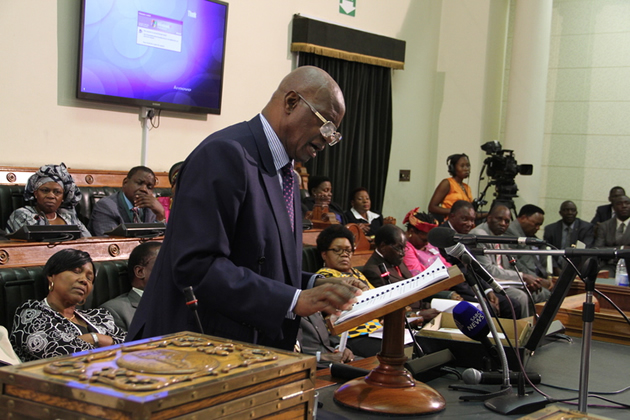Govt suspends platinum export tax


Finance and Economic Development Minister Patrick Chinamasa presents the 2015 National Budget in Parliament yesterday
Business Reporter
Government has suspended export tax on unbeneficiated platinum until January 1, 2017, Finance and Economic Development Minister Patrick Chinamasa said in the 2015 National Budget statement.
In view of the potential to beneficiate platinum, Government introduced an export tax at a rate of 15 percent, with effect from January 1 2015. The move was designed to force companies to build refineries as Government intensified efforts to realise real value of mineral exports.
Zimbabwe has three platinum mining companies – Zimplats, Unki and Mimosa. Following commitment by platinum producers to undertake beneficiation and value addition initiatives, Government decided to defer export tax on unbeneficiated platinum to 2017.
“Platinum producers have, however, demonstrated efforts to beneficiate, to the extent that Zimbabwe Platinum Mines Limited will be commissioning a $200 million base metal refinery in the next twenty four months.
“The facility will be expanded to accommodate other platinum producers. I, therefore, propose to defer export tax on un-beneficiated platinum to January 1 2017,” said Minister Chinamasa.
He said the country is currently one of the major producers of diamonds in the world yet most of the diamonds are exported in raw form, thus depriving the country of employment opportunities as well as potential revenue to the fiscus.
Minister Chinamasa, however, proposed to remove royalties on rough diamonds sold to firms licensed to cut and polish diamonds, with effect from January 1 2015 in a bid to support beneficiation.
He said Government in 2013 comprehensively reviewed the fiscal mining regime, with a view to ensuring a balance between the viability of the mining industry and revenue inflows to the fiscus.
Minister Chinamasa said the long term sustainability of the mining sector requires Government to put in place a mechanism to assess the economic impact of various policy decisions.
The mining fiscal model will enable Government to design an appropriate tax system that attracts investment into the mining sector and promotes optimal mineral extraction and revenue generation, without sterilising minerals, that is, extraction of high grade ores, at the expense of less economic grades.
In addition, the model will be used as an audit tool to assess mineral and revenue leakages and also project future revenues from the mining sector. He also noted that there must be transparency accountability in the mining sector if real value is to be realised.
The effectiveness of the mine fiscal model is dependent on the availability of quality data from the mining sector and availability of data will ensure transparency of the mining operations.
“I, therefore, propose to compel mining houses to provide data to the Zimbabwe Revenue Authority, such as exploration costs, pre and post operative costs, debt-equity mix and repayment terms in a prescribed format,” said Minister Chinamasa.
Zimbabwe is increasingly looking to the mining sector as the anchor to economic revival and development.










Comments